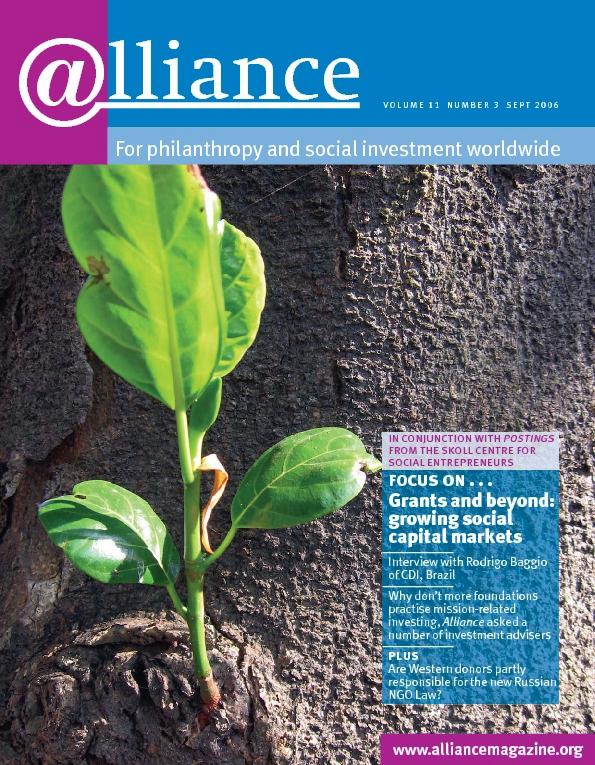‘Democracy promotion’ has become a major area of activity for civil society organizations in recent years. This has provoked a clampdown on civil society by certain governments and in particular attempts by those governments to block ‘democracy assistance’ activities. Why is this happening?
Carl Gershman, President of the National Endowment for Democracy (NED), and his colleague Michael Allen comment extensively on the backlash against democracy promotion in an article in the April 2006 issue of the Journal of Democracy. Their comments are based on research the NED commissioned from the International Centre for Not-for-profit Law, which is reported in this issue of Alliance. They point out that the recent rise in opposition to ‘democracy assistance’ is happening in countries where until recently such activity was tolerated. Why is this happening?
One obvious explanation which Gershman and Allen don’t mention is that since the invasion of Iraq in 2003 George W Bush’s government has placed ‘democracy promotion’ at the centre of its foreign policy. Three years of guerrilla war has left the US wary of further military adventures. ‘Soft power’ instruments have come to the fore, with the funding of ‘democracy assistance’ at levels we have never seen before. Consequently, civil society has now become part of the terrain on which the US and those hostile to its hegemonic ambitions are struggling for influence.
The NED is one of a number of organizations through which this policy is pursued. Its establishment in 1983 was supposed to bring previously covert activities into the open and to provide a more accountable mechanism through which democratic institutions and practices could be promoted. Though it presents itself as a non-profit foundation, the NED receives its funding from the US Congress and works closely with the State Department, the CIA and USAID.
Venezuela is one of a number of countries where its activities have attracted controversy. One group it funds is the Asociación Civil Acción Campesina which, since 2001, has devoted itself to opposing a land reform law introduced by the Chavez government. Among other things, it played a key role in organizing a nationwide petition for a referendum, held in August 2004, which Chavez won with 59 per cent of the vote. The NED says that all it was doing was enabling Venezuelan citizens to exercise a constitutional right. Others see it as a naked attempt to challenge the Chavez government. Would the US tolerate a foreign government funding a campaign in the US for its troops to be withdrawn from Iraq?
In Russia, the NED provided funds for a conference of opposition leaders held immediately before the G8 meeting in July. The eclectic mix of attendees included anti-semitic neo-Nazi groups such as the National Bolshevik Party. The US government has been orchestrating a sustained barrage of attacks on Russia over its increasingly authoritarian tendencies. Energy security concerns and foreign policy differences in the Middle East have a lot to do with this. Ironically, Putin remains far more popular with Russians than Bush is with the American electorate.
The idea that there are fundamental links between democracy, peace and economic development has a long and respectable history both on the left and the right. Amartya Sen has shown that there are strong connections between mass starvation and the lack of accountable government and a free press. Neo-conservatives in the US have for many decades argued that promoting liberal democratic values and institutions is the only way to ensure global peace and stability. The collapse of communism in Eastern Europe after 1989 appeared to vindicate this view and resulted in broad US support under Clinton for military intervention in the Balkans and the use of American power to broker the Dayton Peace agreement.
Some on the political left see the ‘democracy promotion’ movement as a conspiracy to further US interests, and the various foundations and NGOs that are part of this as more or less willing participants in that agenda. I don’t hold this view. I believe there are strong and valid reasons for seeking to foster pluralism in society and create structures which can hold public servants accountable. But given the use of ‘democracy promotion’ by the US government to further wider political and economic goals, is it surprising we are seeing a push back?
Simon Collings is CEO of Resource Alliance. Email simon@resource-alliance.org



Comments (0)